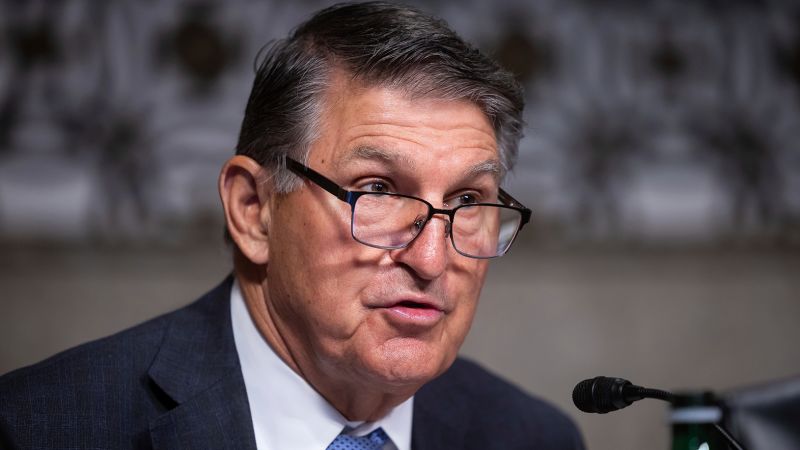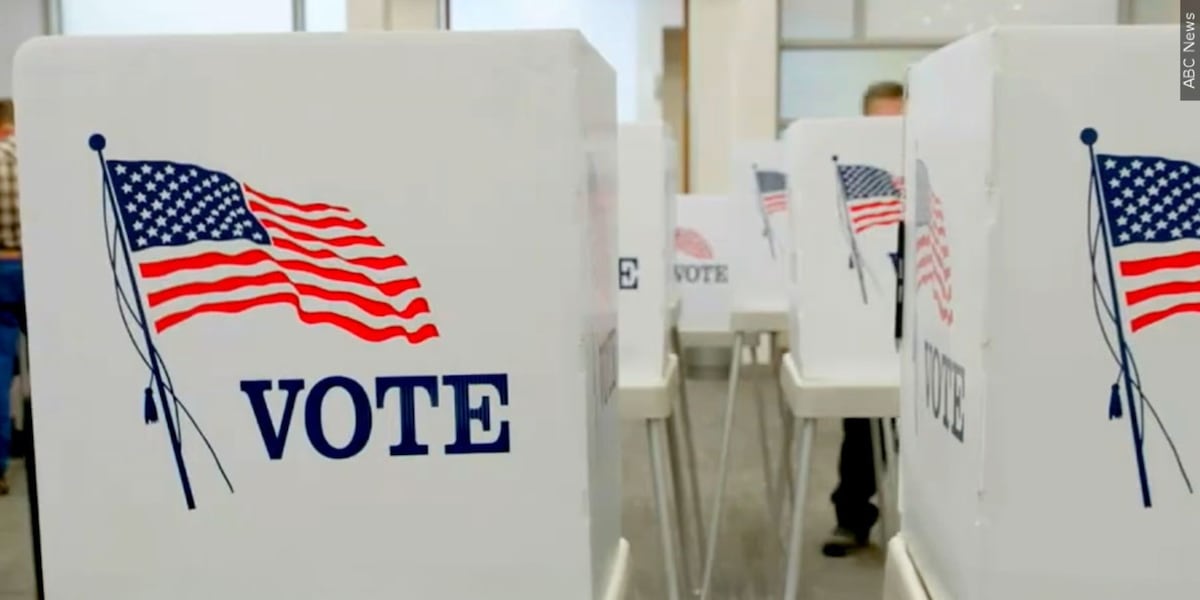CNN
—
West Virginia Sen. Joe Manchin will be back driving Democrats to distraction Monday by appearing in New Hampshire with a group whose exploration of a third-party presidential ticket is stoking fears they could hand the White House to Donald Trump.
The moderate Democratic senator will take part in a town hall hosted by the group No Labels to help launch a new “common sense” platform on immigration, health care, gun control, the economy and other issues that it believes are being ignored by what it views as two ideological and increasingly extreme main parties.
Manchin – who’s facing reelection to the Senate next year but has not yet said whether he’ll run – will be in his familiar political sweet spot, staking out ground to the right of his party and attracting a political spotlight he uses to maximize his influence. Last year, for instance, Manchin’s initial refusal to back a massive climate, tax and social safety net planned forced President Joe Biden to scale back and renegotiate a huge piece of his domestic agenda.
The West Virginia Democrat’s model has served him well with repeated statewide wins in one of the most conservative pro-Trump states in the nation. But he has Democrats doubly nervous – about how any presidential bid could roil Biden’s reelection and how a decision not to seek reelection himself would hand Republicans a Senate seat in 2024.
Manchin told CNN’s Manu Raju last week that his appearance in the Granite State has nothing to do with any third-party presidential run but is merely about advancing a “dialogue for common sense.” But the senator – who has built a power base by keeping people guessing – added, “I’ve never ruled out anything or ruled in anything,” and he dodged a question about whether an independent ticket could hurt Biden in November 2024.
No Labels says it is considering a third-party unity ticket with one Republican and one Democrat in November 2024 and will make a final decision next year based on whether its “insurance plan” has a viable chance of victory.
For now, Manchin’s noncommittal answers are worrying some of his Democratic colleagues. Arizona Sen. Mark Kelly, who represents a swing state Biden won by a sliver of just over 10,000 votes in 2020, said on CNN’s “State of the Union” on Sunday that he has raised the issue of potential third-party candidacies with Manchin.
“I don’t think No Labels is a political party,” Kelly said. “I mean, this is a few individuals putting dark money behind an organization. And that’s not what our democracy should be about. It should not be about a few rich people,” Kelly said. “I’m obviously concerned about what’s going on here in Arizona and across the country.”
CNN has reached out to No Labels, a registered non-profit that does not disclose its donors. The group has blasted previous efforts to dispute its right to participate in the political process as undemocratic.
Democrats are also concerned about a planned third-party run by former Harvard professor and public intellectual Cornel West, who supported independent Vermont Sen. Bernie Sanders during his 2016 and 2020 Democratic presidential campaigns. Even if West were to take just a few thousand votes from Biden – for instance, in the key swing state of Georgia – he could still compromise the president’s hopes of victory.
But West, who is running for the Green Party’s nomination, told CNN’s Kaitlan Collins on Thursday that it was “simply not true” that he could tip the election to Trump, should the ex-president become the GOP nominee. And he accused Democrats of failing to speak up for poor and working people and warned Biden was “leading us toward a Third World War,” in an apparent reference to US support for Ukraine’s attempt to repel Russia’s invasion.
Doubts about the current 80-year-old president are also fodder for Robert Kennedy Jr.’s bid for the Democratic nomination. He has a history of repeating unfounded conspiracy theories about child vaccines or that man-made chemicals could be making children gay or transgender. Kennedy this weekend became embroiled in new controversy after falsely stating that “Ashkenazi Jews and Chinese” people are “most immune” to Covid-19.
Growing speculation about a potential third-party challenge in 2024 – despite the futile history of most previous such efforts – is being fueled by public dissatisfaction with the options. Polls show that both Biden and Trump, the front-runner for the GOP nomination, are unpopular. In fact, a rematch between the two is the one race many voters don’t want to see. Anger at the political establishments in both parties – a defining factor of the politics of the first 20 years of the 21st century – is one reason why some political experts believe that there may be substantial running room for a third-party ticket this cycle, even if the obstacles for success are immense.
The fresh intrigue over the 2024 election also comes as the pace of the campaign heats up. Florida Gov. Ron DeSantis has failed to meet expectations so far as the main GOP challenger to Trump, polling in second in most national polls but still well behind the former president. DeSantis is showing the classic signs of a pivot. His campaign has shed staffers (a spokesman told CNN the number was fewer than 10), and he’s venturing out of his safe zone of only engaging conservative media. On Tuesday, he will join CNN’s Jake Tapper for an exclusive interview after a campaign event in South Carolina.
But Trump is upping his efforts to knock his former protege out of the race, even as he deals with the overhang of two criminal indictments. The ex-president claimed on Saturday he was “totally dominating” DeSantis in Florida polls and it was time for his rival to “get home.” Trump’s fundraising lead is cementing his front-runner status following new campaign finance data. An impressive $72 million haul by Biden and the Democratic National Committee, meanwhile, is not yet assuaging all of the Democratic concerns about the president’s reelection prospects.
No Labels is laying out its platform in a new “Common Sense” booklet that Manchin and Utah’s former Republican Gov. Jon Huntsman will promote in a town hall at Saint Anselm College in Manchester. The platform contains multiple ideas splitting the difference between the Democratic and Republican position on key issues with bipartisan stances anchored to the political center ground.
On immigration, for instance, the group calls for tighter border controls, a reform of asylum procedures and a path to citizenship for Dreamers, or undocumented migrants brought to the United States as children. On guns, the group wants to uphold the right to bear arms but calls for dangerous weapons to be kept out of the hands of “dangerous people,” including with universal background checks and by closing loopholes that make it easier to buy weapons at gun shows. No Labels also wants better community policing and crackdowns on crime.
Given the gridlock, anger and dysfunction in Washington, it’s hard to argue that the current political system is working. But many of these solutions are familiar, having been tried by presidents in either party or groups of cross-party senators. Their failure to make it into law both encapsulates the rationale behind a third-party bid to smash Washington’s political deadlock, but also explains the institutional and political barriers to an independent president ever being elected or effective.
“We think there is an opening today, and if it looks like this a year from now, there could be an opening,” said Ryan Clancy, the chief strategist for No Labels, in an interview with CNN’s Michael Smerconish in May. “To nominate a ticket, we’ve got to clear two pretty high bars, which is the major party nominees need to continue to be really unpopular, but a unity ticket needs to have an outright path to victory.”
No Labels says it would draw supporters equally from Republicans and Democrats and argues that previous third-party candidacies – for instance, by Green Party nominee Jill Stein, consumer advocate Ralph Nader and Libertarian Party candidate Gary Johnson – were unsuccessful because voters didn’t believe they could win. (Some Democrats accused Nader in 2000 and Stein in 2016 of siphoning away votes from Democratic nominees Al Gore and Hillary Clinton and opening the way for the GOP to claim the White House).
The center-left think tank Third Way is warning that a No Labels candidate could be especially dangerous for Biden in the key states that will decide the election. It is highlighting research showing that in 2020, Biden won six of seven states where the margin of victory was three points or less. It argues, therefore, that 79 electoral votes are potentially at risk for Biden from the involvement of a third-party challenger.
Such a challenger would also need to win states where Biden won big, and at least some conservative bastions. And given that Trump’s deeply loyal voters are unlikely to desert him, a third-party candidate seems more likely to pull from the same pool of anti-Trump Republicans and moderate and independent voters Biden is targeting with a campaign rooted in his warnings against the threat to democracy from Trump’s “Make America Great Again” populism.
An analysis by CNN’s Harry Enten shows that voters who don’t have a favorable view of either Biden or Trump are more likely to side with the current president in the end. In an average of the past three Quinnipiac University polls, Biden leads Trump by 7 points among those who don’t have a favorable view of either man. A third name on the ballot could complicate this equation.
There is also the question of whether No Labels – with its condemnation of “two major political parties dominated by angry and extremist voices driven by ideology and identity politics” – is drawing a false equivalency between Republicans and Democrats. Trump, for example, sought to overturn a democratic election in 2020 to stay in power, while Biden has enacted rare bipartisan legislation including over gun safety and infrastructure.
Former New Jersey Gov. Chris Christie, who is hoping to thwart Trump’s bid for a third consecutive GOP nomination, warned Sunday that a third-party candidacy could play directly into the former president’s hands. “There are only two people who will get elected president of the United States in November of ’24 – the Republican nominee for president and the Democratic nominee for president,” Christie said on ABC News’ “This Week.”
“They think they know who they (are) going to hurt. They want to hurt Donald Trump if he’s the nominee. But. … you never quite know who you’re going to hurt in that process.”































